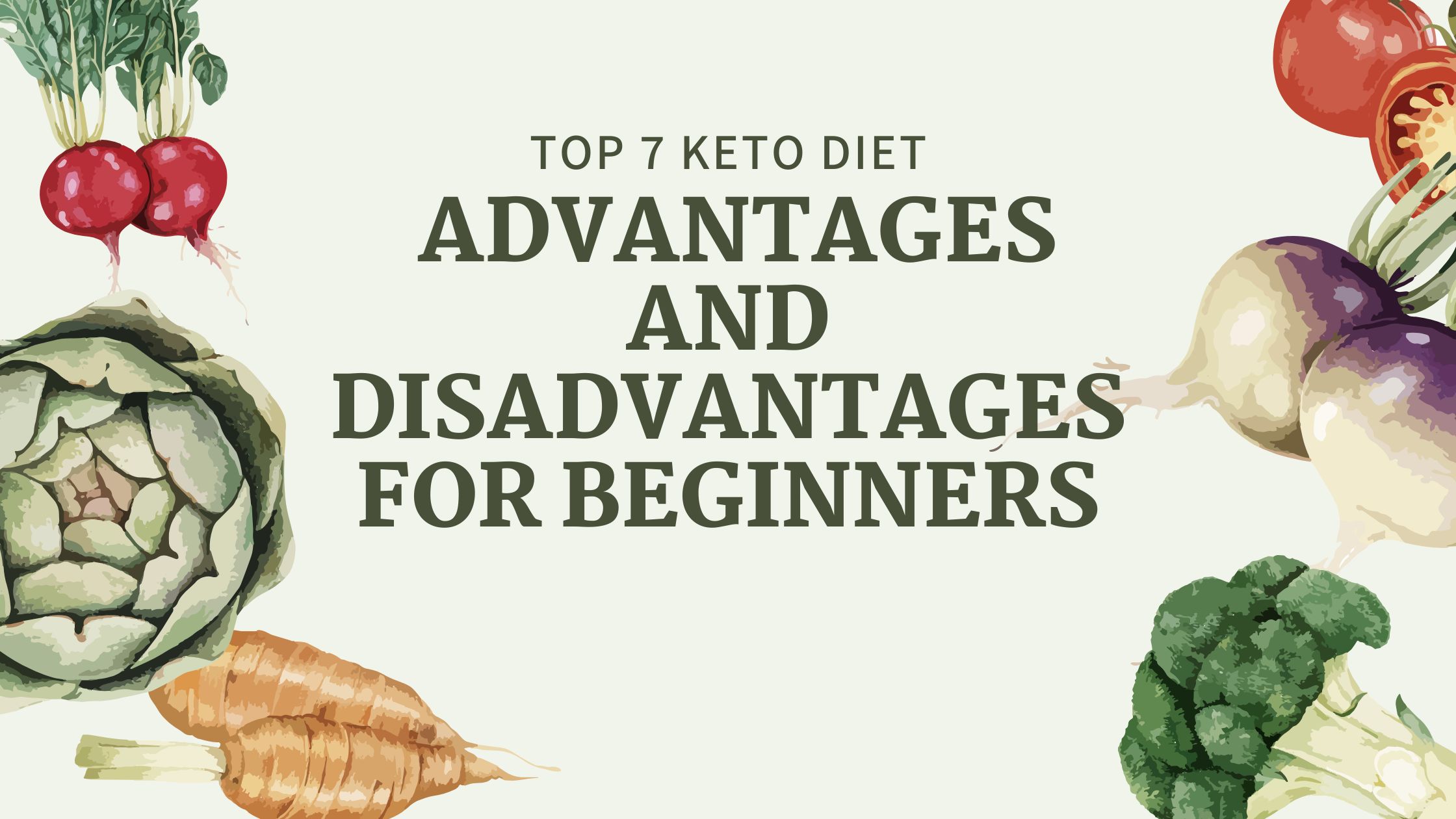Introduction:-
Top 7 Keto Diet Advantages and Disadvantages for Beginners

The ketogenic (keto) diet has gained massive popularity in recent years for its ability to help people lose weight and improve certain health conditions. However, like any diet, it has its pros and cons. Before you jump on the keto bandwagon, it’s crucial to understand both the advantages and disadvantages, especially if you’re a beginner. Here’s a breakdown of the top 7 keto diet advantages and disadvantages..
Advantages of the Top 7 Keto Diet
1. Rapid Weight Loss
One of the most significant benefits of the keto diet is quick weight loss. By shifting your body into a state of ketosis, where fat is used as the primary energy source, you can shed pounds rapidly. This is particularly beneficial for those looking for fast results.
2. Appetite Suppression
The high-fat content of the keto diet can lead to decreased hunger and appetite suppression. Many people find they naturally eat fewer calories without feeling deprived, which aids in weight loss.
3. Improved Mental Clarity and Focus
Many keto dieters report enhanced mental clarity and focus. Ketones, which the body produces during ketosis, are an efficient energy source for the brain, leading to improved cognitive function.
4. Better Blood Sugar Control
For those with type 2 diabetes or insulin resistance, the keto diet can help regulate blood sugar levels. By drastically reducing carbohydrate intake, blood sugar spikes are minimized, leading to better overall control.
5. Increased Energy Levels
Once the body adapts to using fat as fuel, many individuals notice improved and more consistent energy levels. Without the highs and lows associated with carb-heavy meals, keto dieters often feel more energetic throughout the day.
6. Reduced Inflammation
The keto diet has anti-inflammatory effects, which can benefit people suffering from chronic pain or inflammatory conditions. By eliminating sugars and processed carbs, inflammation in the body may decrease.
7. Better Heart Health
While it may seem counterintuitive, a well-formulated keto diet can improve heart health. It can help lower triglycerides and increase HDL (good) cholesterol, improving overall cardiovascular health.
Disadvantages of the Keto Diet
1. Keto Flu
In the first few days or weeks of starting the keto diet, many beginners experience “keto flu.” Symptoms include headaches, fatigue, irritability, and dizziness, as the body adapts to burning fat instead of carbs. While temporary, it can be discouraging.
2. Nutrient Deficiencies
The restrictive nature of the keto diet means you might miss out on essential nutrients found in carb-rich foods like fruits, vegetables, and grains. Over time, this can lead to nutrient deficiencies, requiring careful planning or supplementation.
3. Difficult to Maintain Long-Term
The keto diet can be difficult to stick to in the long run due to its restrictive nature. Many people find it hard to avoid carbs, especially in social settings, which can make adherence challenging.
4. Potential for High Cholesterol
While some people experience better heart health on keto, others may see a rise in LDL (bad) cholesterol due to the high fat intake. This can be concerning for individuals with pre-existing heart conditions.
5. Digestive Issues
A common side effect of the keto diet is constipation due to the lack of fiber-rich foods like fruits and whole grains. This can lead to digestive discomfort if not managed properly.
6. Risk of Dehydration and Electrolyte Imbalance
The keto diet can lead to dehydration and an imbalance of electrolytes. As carbs retain water, cutting them can cause the body to lose water and essential minerals like sodium, potassium, and magnesium, leading to muscle cramps or fatigue.
7. Social and Dining Challenges
Following a strict keto diet can be challenging in social settings. Whether dining out with friends or attending events, it may be difficult to find keto-friendly options, which could lead to feeling isolated or restricted.
Why do some people experience increased energy levels on keto?
Some people experience increased energy levels on the ketogenic (keto) diet due to several factors related to how the body shifts its primary energy source from carbohydrates to fats. Here are the main reasons:

- Steady Energy Supply: On keto, the body burns fat for energy instead of carbs. This process produces ketones, which are a more stable and sustained source of energy compared to glucose, leading to fewer energy crashes and more consistent energy levels throughout the day.
- Improved Blood Sugar Control: The keto diet helps stabilize blood sugar levels because it minimizes carb intake, preventing the spikes and crashes associated with glucose metabolism. This stable blood sugar can lead to fewer feelings of tiredness or lethargy.
- Mitochondrial Efficiency: When the body is in ketosis, it produces ketones that are more efficient at generating energy within cells. This can enhance mitochondrial function, leading to improved energy production and stamina.
- Reduced Inflammation: Many people report reduced inflammation while on keto. Inflammation can cause fatigue, so with less inflammation, individuals may feel more energized.
- Mental Clarity and Focus: Many keto dieters experience a boost in cognitive function and mental clarity, which can feel like an increase in overall energy.
The combination of these factors can lead to a more energized and alert feeling for people on a ketogenic diet. However, individual responses to keto vary, and not everyone may experience the same benefits.
Why is it difficult for some people to maintain the keto diet long-term?
Maintaining the ketogenic (keto) diet long-term can be challenging for several reasons, primarily related to its restrictive nature and the way it affects lifestyle, preferences, and health. Here are the key factors:

- Restrictive Nature: The keto diet requires a significant reduction in carbohydrates (usually 5-10% of total calories), which can be difficult for people accustomed to eating a balanced diet that includes bread, pasta, rice, fruits, and other carb-rich foods. This limitation can feel restrictive and lead to cravings, making it hard to stick to the diet long-term.
- Social and Cultural Eating Norms: Many social events, gatherings, and cultural traditions involve high-carb foods. Sticking to keto in these settings can be challenging and isolating, as people may feel they need to avoid certain social situations or bring their own food, which can lead to frustration and eventually giving up on the diet.
- Monotony in Food Choices: The keto diet limits the variety of foods people can eat, especially fruits, starchy vegetables, grains, and legumes. This can make meal planning repetitive and less enjoyable, leading to boredom with the diet over time.
- Nutritional Imbalance: While the keto diet can provide certain benefits, it may lack key nutrients like fiber, vitamins (e.g., vitamin C), and minerals found in carb-rich foods. Long-term adherence to keto may require careful planning or supplementation, which some people may find cumbersome.
- Adapting to Fat Metabolism: Not everyone responds well to relying on fats as the primary fuel source. Some individuals experience fatigue, brain fog, or digestive issues (like constipation) even after the initial adaptation period, making the diet difficult to sustain.
- Psychological Effects and Cravings: For some, the restriction of carbs can lead to feelings of deprivation, triggering psychological cravings for foods they cannot have. This can lead to a cycle of yo-yo dieting, where people go on and off keto, which can be discouraging and unsustainable.
- Lack of Flexibility: The keto diet requires careful tracking of macronutrient intake (fats, proteins, and carbs). This can feel overwhelming for some, particularly if they have a busy lifestyle or prefer not to focus so intensely on food.
- Possible Side Effects: Some people experience side effects like the “keto flu” (a group of symptoms including fatigue, headaches, and irritability) during the initial phase of the diet, which may discourage long-term adherence. Additionally, concerns about long-term effects on cholesterol, heart health, or kidney function can make people hesitant to continue.
Because of these challenges, many people find the keto diet difficult to sustain over time, even if they initially see positive results.
Conclusion
The keto diet offers a range of benefits, especially for those seeking rapid weight loss, better mental focus, and improved blood sugar control. However, it’s not without its challenges. From the initial keto flu to long-term adherence difficulties, beginners should weigh the pros and cons before committing to this dietary lifestyle. With careful planning, the keto diet can be a powerful tool, but it may not be suitable for everyone. Always consult with a healthcare professional before making significant changes to your diet.
References
- Johns Hopkins Medicine – Ketogenic Diet
This page provides an overview of the keto diet, its benefits, and the potential risks, particularly for certain health conditions. - Harvard T.H. Chan School of Public Health – The Ketogenic Diet: Is the Ultimate Low-Carb Diet Good for You?
This article explores the science behind the keto diet, the associated health benefits, and the potential side effects. - Healthline – The Ketogenic Diet: A Detailed Beginner’s Guide to Keto
A comprehensive guide to starting the keto diet, including its advantages and disadvantages for beginners. - Cleveland Clinic – What is the Keto Diet?
Cleveland Clinic covers the basics of the keto diet, its potential for weight loss, and the possible health risks to consider. - Mayo Clinic – Ketogenic Diet: Is the Ultimate Low-Carb Diet Good for You?
Mayo Clinic provides expert opinions on the keto diet, highlighting its possible health effects, including the pros and cons.

